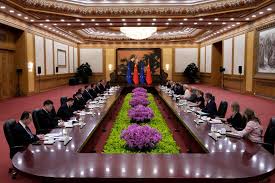Taking the pulse: Does the EU-China summit show a weakened European hand with Beijing?

Brussels: This commentary was first published by Carnegie Europe on 24 July 2025 and is part of the Strategic Europe blog series.
The EU-China summit marks the fiftieth anniversary of diplomatic relations between Brussels and Beijing. Considering their current conflicting priorities, does the summit demonstrate Europe’s declining leverage with China?
While the summit brings the EU and China face-to-face, it will not make them see eye to eye. There are simply too many unresolved structural issues, from the China-Russia friendship to unfair economic competition. Still, the summit allows the EU to voice concerns directly to Chinese president Xi Jinping, and thereby to “de-risk[…] through diplomacy” by managing the relationship.
One of the things strengthening the EU’s hand in its relationship with China will likely not come from the EU-China summit itself, but from the meeting with Japan the day before. The visit underlined the EU’s commitment to the Indo-Pacific, while showing that the EU’s regional presence is welcomed.
Additionally, the EU and Japan signed a joint statement, including the launch of a Competitiveness Alliance. Meanwhile, the EU-China summit might only result in a short joint statement on climate—and even this low-hanging fruit might be out of reach.
Overall, the summit’s key added value is that it will bring the EU and China in the same room—but it is unlikely to lead to structural change. If this realistic assessment pushes EU member states to continue Europe’s quest for strategic autonomy, the summit might strengthen the EU’s hand still.




